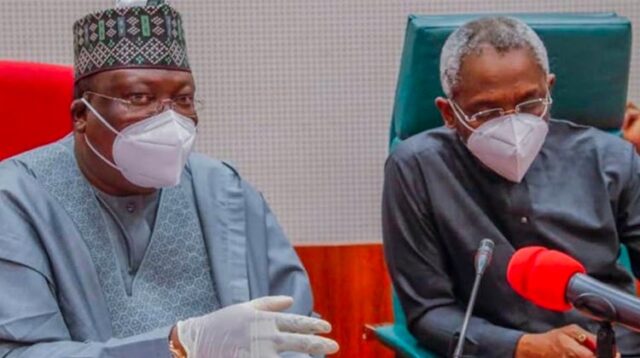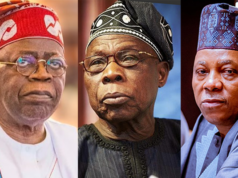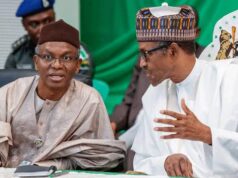
The Senate on Wednesday justified the President, Major General Muhammadu Buhari (retd.)’s plan to obtain $4.054bn and €710m ($$839m) loans.
The Chairman of the Senate Committee on Media and Public Affairs, Senator Ajibola Basiru, who stated this in an interview with one of our correspondents in Abuja, said there was no country that does not engage in deficit financing.
Basiru said this as the Director General of the Debt Management Office, Patience Oniha, while giving a breakdown of the public debt stock for the second quarter of 2021 during a virtual media presentation on Wednesday, said Nigeria’s total public debt stock rose from N33.11tn as of March 31, 2021 to N35.47tn as of June 30, 2021.
This suggests an increase of N2.36tn or 7.12776 per cent increase.
The President had on Tuesday submitted to the National Assembly, a request for approval to obtain fresh external loans of $4.054bn and €710m (($$839m).
According to a letter written to both chambers of the National Assembly, Buhari is also seeking the federal legislature’s approval for grant components of $125m in the 2018-2020 external rolling borrowing plan.
The President had on May 18, 2021sought the approval of the Senate to borrow $6.18bn external loan to finance this year’s N5.6tn budget deficit.
He said the loans would be used to finance critical projects and create jobs.
If the President gets the go-ahead to obtain the loans, the country’s debt profile will rise.
All countries engage in deficit financing, we’re still within borrowing limit – Senate
But in an interview with The PUNCH, Basiru allayed the fears of Nigerians over the borrowing plans of the President, assuring them that there was no cause for concern.
He explained that the latest loan request by the President was an addendum to the earlier one approved by the federal parliament and that it was still within the framework of the external borrowing plan of the government
Basiru said the President accompanied the loan request with supporting documents which contained details of what the money would be used for.
He said, “What Nigerians should be looking at is the benefit and the advantage the society would have when the loans are taken and effectively utilised.
“There is no country that does not engage in deficit financing. We are still within the approved limit guaranteed by law.
“The borrowing is for the development of the country and they are tied to specific projects.
“It is part of the borrowing plans of the government which had already been approved in the Medium Term Expenditure Framework and Fiscal Strategy Paper.
“The latest request is not a fresh loan, but an addendum to the earlier one which we have approved and it is still within the framework of the external borrowing plan of the government
“It is important to galvanise the economy and invest in critical infrastructure that will put us in a better position to prepare our country for the future
“What we should concern ourselves with is to look at the projects that the loans are attached to and the social economic benefits of those projects.”
According to Investopedia, a budget deficit occurs when a government spends more in a given year than it collects in revenues, such as taxes.
Commenting on the development, some non-governmental organisations expressed concern that the legislature had failed in its responsibility of checking the executive.
The Executive Director, Human and Environmental Development Agenda, Olarewaju Suraju, said the ninth National Assembly had been working against Nigerians and the constitution following its recent loan approvals.
He said, “This ninth Assembly has just not been a rubber stamp but has been working against the interest of the country and the constitution.
“It is not surprising they don’t have proper scrutiny. One would have expected all affected agencies, ministries and departments to defend the proposed activity or expenditure under the loan such that it would be convinced that such funds were needed and they would be judiciously used and prudently managed as well seek proposal for the repayment of the loan.
“But you can’t expect such scrutiny from this current assembly.”
The founder, Follow The Money International, Hamzat Lawal, on his part, said, “Nigeria’s total debt profile is N31tn, according to Debt Management Office, and we are currently using over 70 per cent of income generated to service these debts.
“Yet, we are also seeing an administration that is still bent on borrowing more money and a National Assembly that keeps approving these loans despite the implications on the national purse.
“I think it is beyond thinking whether the National Assembly is a rubber stamp or not. It is now a matter of whether there is anyone in public office who is working to ensure we still have a country by 2023.”
Buhari’s loans for budget financing, not for looting as done by PDP, says ruling party
In a related development, the All Progressives Congress and the opposition Peoples Democratic Party on Wednesday disagreed over rising debts under the Buhari regime
The APC defended plans by the President to borrow additional $4bn and €710m from foreign lenders to finance projects.
The party explained that the regime was seeking additional loans to finance critical projects in order to stimulate the economy and create jobs in the nation’s interest.
This was contained in a statement titled, “APC to PDP: Borrowings are to finance development projects, signed by the party’s National Secretary, Senator John Akpanudoedehe, in Abuja, on Wednesday.
The PDP had on Tuesday said the loan request was another move by the President and his All Progressives Congress-led regime to further mortgage the future of Nigeria and Nigerians with less than two years left in office.
Akpanudoedehe on Wednesday said the borrowings were for the benefit of the country.
He stated, “Borrowings by the President Muhammadu Buhari-led Federal Government are for the good of the country as the money is used to develop critical infrastructure that is stimulating economic growth, generating jobs, reducing poverty and improving the general well-being of the citizenry.
“Unlike in the brazen looting days of the Peoples Democratic Party, the borrowings are designed to finance the deficit in the 2021 budget to enable the realisation of the Nigerian Economic Sustainability Plan that touches key sectors such as infrastructure development, boosting healthcare services, strengthening agriculture to deepen food security, more energy generation and continued tackling of the ravaging COVID-19 global pandemic.
“From the foregoing, it is abundantly clear that the borrowing is hinged on genuine needs and based on the necessity to strengthen the foundation of the national economy and achieve the desired primary purpose of the government of uplifting the living standard of the citizens.
“It was in the PDP’ era that loans to fund power generation, purchase arms and ammunition to fight a raging insurgency were misappropriated and diverted to fund PDP activities; and the borrowed money ultimately found its way to the pockets of cronies, friends and family members of administration officials. Nigeria is still servicing a $460m loan taken from China to fund a phony Abuja closed-circuit television contract awarded in August 2010.”
The party urged Nigerians to recall that the PDP had in its 16 years of alleged misrule pushed the country into a dark ditch of insolvency, and a period in which most state governments could not pay workers’ salaries, not even the minimum wage, or settle contractors’ bills and cater for patients in hospitals, to name a few.
Akpanidoedehe welcomed the bi-partisan support the President was receiving from the National Assembly.
APC borrowing to finance corrupt lifestyles of its leaders and their cronies, alleges PDP
In response, the National Publicity Secretary of the PDP, Kola Ologbondiyan, in an interview with The PUNCH, said, “For us in the PDP, the APC has simply confirmed what we have always known since 2014. The APC can only function in opposition. It simply lacks what it takes to provide leadership.
“This regime is the least qualified to talk about corruption. It is simply borrowing to finance the corrupt lifestyles of its party leaders and their cronies. The money borrowed since 2015 has ended up in private pockets. This explains the various financial scandals in FIRS (Federal Inland Revenue Service) , NPA (Nigerian Ports Authority), NHIS (National Health Insurance Scheme), NCC (Nigerian Communications Commissions) and several government parastatals under their watch. Nigerians have started a countdown to 2023.”
CBN monetary committee member expresses concern about mounting debts
Meanwhile, a member of the federal monetary committee, who spoke on the condition of anonymity, said, “I think we get to a level where we should be concerned. Yes, every country takes loans, but what do you use the loans for? How productive are the loans, especially how productive are the previous loans you have taken?
“In a situation where your debt servicing ratio to revenue ratio is getting out of hand, very soon every kobo you make will be expended on servicing debt. So, we can fall into a debt trap, which is avoidable. If you look at our Gross Domestic Product, a lot of our GDP is informal. They don’t pay tax. Using a very high GDP ratio, which includes agriculture, informal sector, services, industry that hardly pays any tax, there may be a disturbance in the case of Nigeria.
“You can use a high GDP ratio in countries where every sector is formalised, and tax avoidance is extremely low. But in reality, comparing our tax revenue, we should be borrowing in a relevant way. It should remind us of how serious this problem is.
“As a country, we should be looking at how to resolve our revenue problem. And how can the government transfer some of its commitments to public private partnership. There are a lot of developmental projects that the government may want to do that we should actually explore other ways of funding them. It doesn’t have to be through the government’s budget. They can be through private-public participation or other arrangements that we can make. Once we create an environment that is attractive that has a framework that makes it possible, the private sector will bring in money. Local and foreign. This is what we should be exploring.
The Head of Economics Department, Pan-Atlantic University Lagos, Dr Olalekan Aworinde, told The PUNCH that deficit financing was not a big issue, adding that it was common all over the world.
He, however, added, “If Nigeria is having a lot of deficits, meaning that we are borrowing, the question we should be asking the government is what the deficit financing is being used for? Is it being used to accelerate the level of growth? Or to reduce the level of unemployment.”







